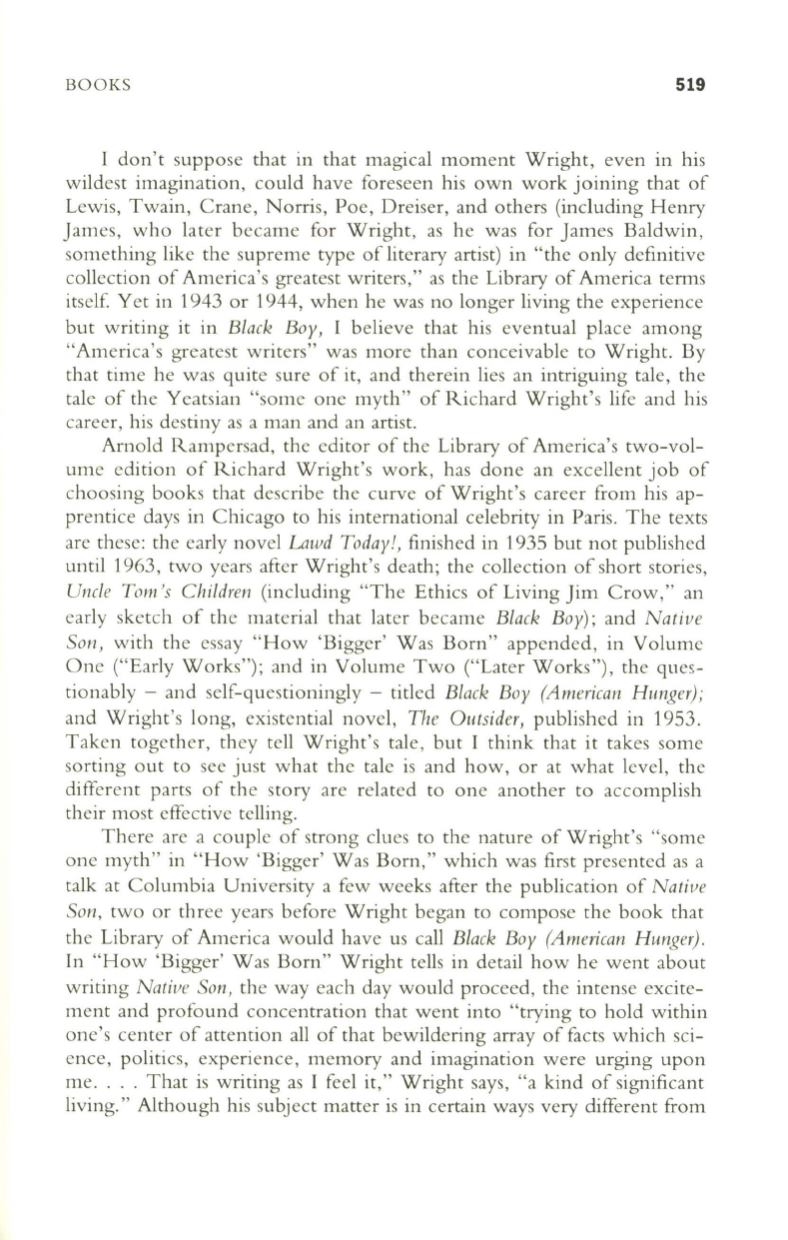
BOOKS
519
I don't suppose that in that magical moment Wright, even in his
wildest imagination, could have foreseen his own work joining that of
Lewis, Twain, Crane, Norris, Poe , Dreiser, and others (including Henry
James, who later became for Wright, as he was for James Baldwin,
something like the supreme type of literary artist) in "the only definitive
collection of America's greatest writers," as the Library of America terms
itself Yet in 1943 or 1944, when he was no longer living the experience
but writing it in
Black Boy,
I believe that his eventual place among
"America's greatest writers" was more than conceivable to Wright. By
that time he was quite sure of it, and therein lies an intriguing tale, the
tale of the Yeatsian "some one myth " of Richard Wright's life and his
career, his destiny as a man and an artist.
Arnold Rampersad, the editor of the Library of America's two-vol–
ume edition of Richard Wright's work, has done an excellent job of
choosing books that describe the curve of Wright's career from his ap–
prentice days in Chicago
to
his international celebrity in Paris. The texts
are these: the early novel
Lawd Today!,
finished in 1935 but not published
until 1963, two years after Wright's death; the collection of short stories,
Uncle Tom
'5
Children
(including "The Ethics of Living Jim Crow," an
early sketch of the material that later became
Black Boy);
and
Native
SOrl,
with the essay "How 'Bigger' Was Born" appended, in Volume
One ("Early Works"); and in Volume Two ("Later Works"), the ques–
tionably - and self-questioningly - titled
Black Boy (American Hunger);
and Wright's long, existential novel,
The Outsider,
published in 1953.
Taken together, they tell Wright's tale, but I think that it takes some
sorting out to see just what the tale is and how, or at what level, the
different parts of the story are related to one another to accomplish
their most effective telling.
There arc a couple of strong clues to the nature of Wright's "some
one myth" in "How 'Bigger' Was Born," which was first presented as a
talk at Columbia University a few weeks after the publication of
Native
Son,
two or three years before Wright began to compose the book that
the Library of America would have us call
Black Boy (American Hunger).
In
"How 'Bigger' Was Born" Wright tells in detail how he went about
writing
NatirJe Son,
the way each day would proceed, the intense excite–
ment and profound concentration that went into "trying
to
hold within
one's center of attention all of that bewildering array of facts which sci–
ence, politics, experience, memory and imagination were urging upon
me.... That is writing as I feel it," Wright says, "a kind of significant
living." Although his subject matter is in certain ways very different from


